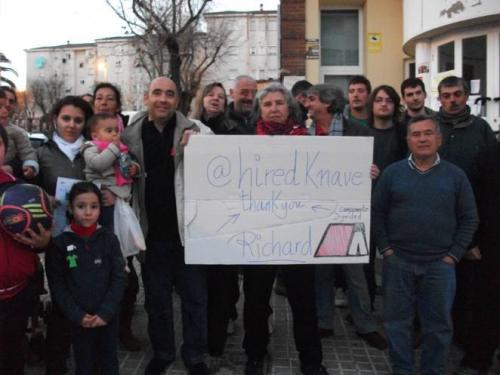Translation of an article by Portuguese sociologist Boaventura de Sousa Santos, the Spanish translation of which, by Antoni Jesús Aguiló y José Luis Exeni Rodríguez, was originally published in Rebelión on 21st February.
(“Holy God! How do you clean up so much trash?”)
Ninth Letter to the Lefts
2013 in Europe will be a disaster on the social level and unpredictable on the political level. Will European governments, especially those of the south, create the stability that allows them to finish their mandate or will there be political crises that force them to call advance elections? Let’s say that each one of these hypotheses has a probability of 50%. This being the case, citizens must rest assured that whatever political instability that might arise is the price to pay so that an alternative power, and not just a changing of the guard in power, might come about. Can the lefts build this alternative? Yes, but only if they transform themselves and unite, which is demanding a great deal in little time.
Here is my contribution toward the creation of this alternative. First of all, the lefts must focus on the welfare of citizens and not on how creditors might react. History shows that financial capital and multilateral instituions (IMF, ECB, World Bank, European Commission) are only rigid to the extent that circumstances do not oblige them to be flexible. Secondly, what historically unites the lefts is the defence of the strong Welfare State: obligatory and free public education; a universal and free state health service; sustainable social security with a pensions system based on the principle of redistribution and not capitalisation; the nationalisation of strategic assets and natural monopolies (water, postal services)
The differences among the lefts are considerable, but they do not prevent this basic convergence that always determined the electoral preferences of the popular classes. It is true that the right also contributed to the Welfare State (one need only recall Bismarck in Prussia), but always under pressure from the lefts, and it withdrew when pressure reduced, as is the case, for more than thirty years, in Europe. The defence of the strong Welfare State must be the greatest priority and it must shape the rest. The Welfare State is not sustainable without development. In that sense, if divergences do arise in terms of ecology, science or flexicurity at work, the basic agreement on development is unequivocal and as such constitutes the second priority to unite the lefts. Since the safeguarding of the Welfare State is a priority, everything must be done to guarantee investment and job creation.
And here is where the third priority that must unite the lefts arises. If guaranteeing the Welfare State and development requires renegotiating with the Troika and other creditors, then this renegotiation must be carried out with determination. That is, the hierarchy of priorities shows clearly that it is not the Welfare State that must adapt to the conditions of the Troika; on the contrary, it should be the latter who adapt to the priority of maintaining the Welfare State. This is a message that both citizens and creditors will understand well, albeit for different reasons.
In order for unity of the lefts to have political success, three factors must be considered: risk, credibility and opportunity. With regard to risk, it is important to show that the risks are not greater than those that European citizens are already running: those of the south, a greater impoverishment chained to periphery status, providing cheap labour to developed Europe; and those in general, progressive loss of rights in the name of austerity, higher unemployment, and democracies held captive by finance capital. The risk of an alternative is a calculated risk with the purpose of testing the conviction with which the European project is being safeguarded.
Credibility is rooted, on the one hand, in the conviction and seriousness with which the alternative is formulated, and the democratic support it can count on, and, on the other, in having shown the capacity to make sacrifices in good faith (Greece, Ireland and Portugal are an example of this). It is only sacrifices imposed in bad faith that are not accepted, sacrifices imposed as maximum demands merely to open up roads to greater sacrifices.
And the opportunity is there to be seized. The widespread outrage, expressed en masse in the streets, squares, social networks, workplaces, health centres, educational institutions, among other spaces, has not come together as a social bloc capable of rising to the challenges that circumstances are posing. The current context of crisis requires a new politics of popular fronts at a local, state and European level made up of a heterogeneous plurality of subjects, social movements, NGOs, universities, public institutions, governments, among other actors who, united in their diversity, prove capable, through flexible forms of organisation, articulation and action, of achieving a major unity in action and purpose.
The objective is to unite the forces of the left in democratic alliances that are structurally similar to those that constituted the basis for the anti-fascist fronts in the inter-war period, with which there are worrying similarities. Two of these must be mentioned: the deep financial and economic crisis and the overwhelming pathologies of representation (widespread crisis in political parties and their inability to represent the interests of the popular classes) and of participation (the feeling that voting changes nothing). The danger of social fascism and its effects, which are felt more and more, creates the need for a formation of fronts capable of struggling against the fascist threat and of mobilising society’s sleeping democratic energies. At the start of the 21st century, these fronts must emerge from below, from the most articulated politicisation of the outrage that flows in our streets.
To wait without hope is the worst curse that can befall a people. And hope is not invented: it is built with dissent, capable rebellion and real alternatives to the current situation.







